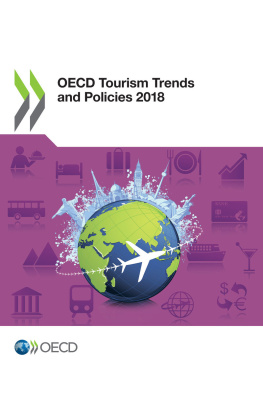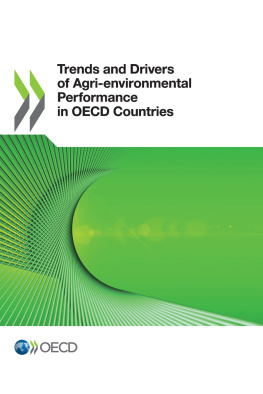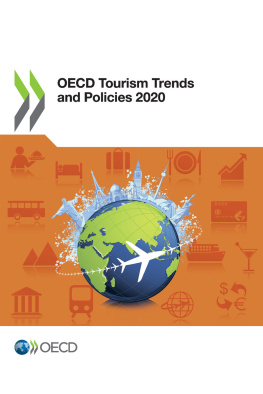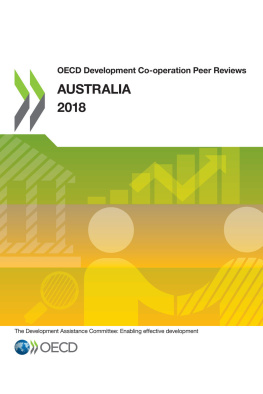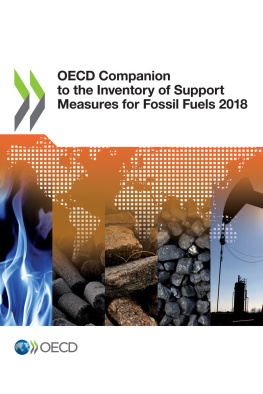coll. - OECD Tourism Trends and Policies
Here you can read online coll. - OECD Tourism Trends and Policies full text of the book (entire story) in english for free. Download pdf and epub, get meaning, cover and reviews about this ebook. year: 0, genre: Politics. Description of the work, (preface) as well as reviews are available. Best literature library LitArk.com created for fans of good reading and offers a wide selection of genres:
Romance novel
Science fiction
Adventure
Detective
Science
History
Home and family
Prose
Art
Politics
Computer
Non-fiction
Religion
Business
Children
Humor
Choose a favorite category and find really read worthwhile books. Enjoy immersion in the world of imagination, feel the emotions of the characters or learn something new for yourself, make an fascinating discovery.
OECD Tourism Trends and Policies: summary, description and annotation
We offer to read an annotation, description, summary or preface (depends on what the author of the book "OECD Tourism Trends and Policies" wrote himself). If you haven't found the necessary information about the book — write in the comments, we will try to find it.
coll.: author's other books
Who wrote OECD Tourism Trends and Policies? Find out the surname, the name of the author of the book and a list of all author's works by series.
OECD Tourism Trends and Policies — read online for free the complete book (whole text) full work
Below is the text of the book, divided by pages. System saving the place of the last page read, allows you to conveniently read the book "OECD Tourism Trends and Policies" online for free, without having to search again every time where you left off. Put a bookmark, and you can go to the page where you finished reading at any time.
Font size:
Interval:
Bookmark:
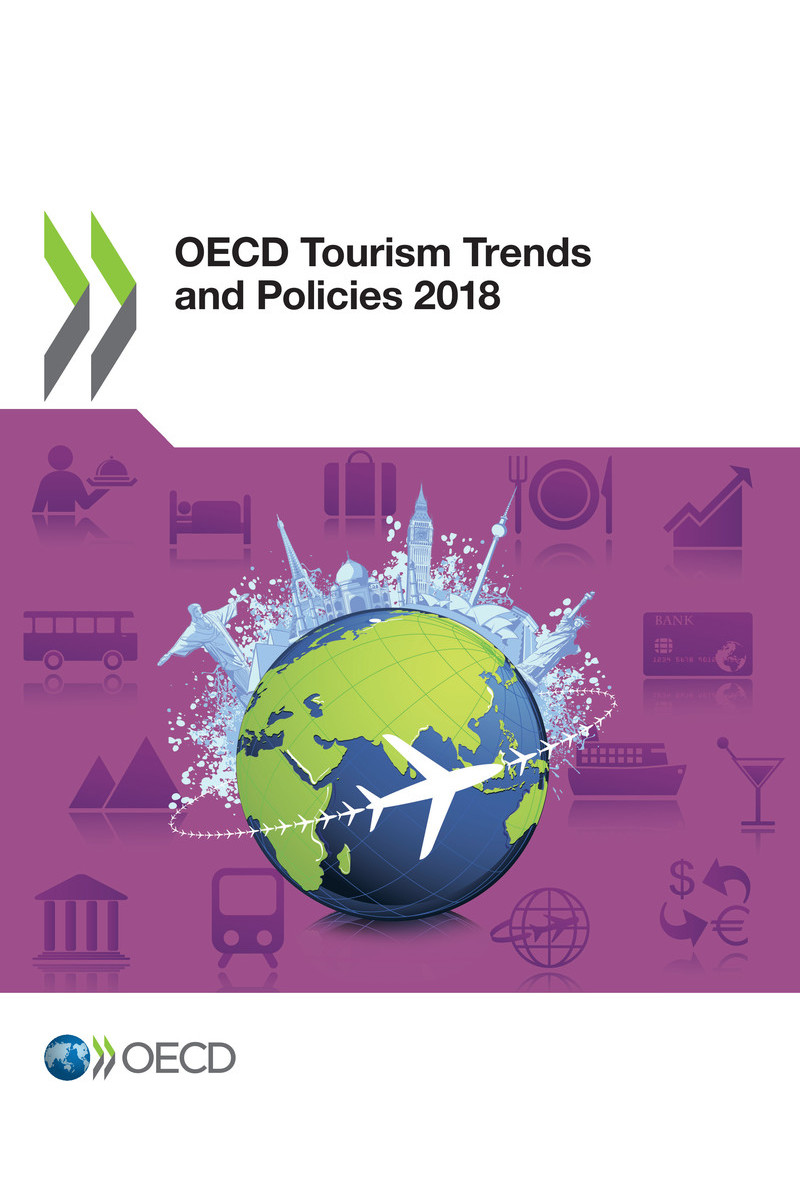
OECD (2018), OECD Tourism Trends and Policies 2018 , OECD Publishing, Paris.
http://dx.doi.org/10.1787/tour-2018-en
Tourism is one of the largest and fastest growing sectors in the world economy. It plays a key role in job creation, export revenue and domestic value added, and directly contributes, on average, 4.2% of GDP, 6.9% of employment and 21.7% of service exports in OECD countries. Globally, international tourist arrivals grew to over 1.2 billion in 2016, with arrivals to OECD countries accounting for just over half and matching the global growth rate of 3.9% as compared to 2015.
OECD Tourism Trends and Policies 2018 focuses on key policy and governance reforms in tourism and provides a global perspective with the inclusion of 49 OECD and partner countries. As always, it is a rich source of data on domestic, inbound and outbound tourism, and on the size of the tourism economy, and provides a clear picture of new policies designed to improve destination competitiveness.
With the tourism economy evolving rapidly, major long-term trends, such as changing demographics, evolving demand, digitalisation, and climate change, present new opportunities and challenges. As such, OECD Tourism Trends and Policies 2018 explores the impacts and relevance of megatrends for tourism to 2040. It underlines the need for countries to develop strategic approaches to adapt in an increasingly dynamic environment, as well as modernise regulatory and legislative frameworks, building on broad stakeholder engagement and taking account of new and innovative business approaches to service delivery.
This report also examines the need for a shift to investment and financing practices that better support sustainable tourism development. It particularly highlights that governments can promote investment and financing for sustainable tourism development by encouraging the uptake of green financing instruments, and by incorporating environmental and sustainability criteria into public financing and investment supports. Policies are also needed to better co-ordinate actions across government, and encourage more responsible business practices through the integration of environmental and social criteria into tourism policies and programmes. It is therefore essential that government, industry and civil society collaborate in order to take work forward in these areas.
Many of these policy issues were discussed at the 2017 OECD High Level Meeting on Tourism, where 45 member countries and partner economies endorsed the Policy Statement, Tourism Policies for Sustainable and Inclusive Growth. The Policy Statement recognises that tourism has an important role to play in the transition to a green economy and that an in-depth analysis of megatrends can help policymakers to bring currently unforeseen and emerging issues onto the strategic policy agenda. It highlights that a shift to more coherent and comprehensive approaches to tourism policy development will help reframe tourism growth to better spread the benefits, address inequalities, and improve the resilience of economies.
I would like to thank the OECD Tourism Committee for their work in preparing OECD Tourism Trends and Policies 2018 , in partnership with the European Union. This publication remains an international reference and benchmark on how effectively countries are supporting sustainable and inclusive tourism growth.

Angel Gurra
OECD Secretary-General
This report presents the 2018 edition of the OECD Tourism Trends and Policies publication. It is prepared by the OECD Centre for Entrepreneurship, SMEs, Regions and Cities (CFE), led by Lamia Kamal-Chaoui, Director.
OECD Tourism Trends and Policies 2018 highlights good practices and key policy and governance reforms in tourism, providing a global perspective with the inclusion of 49 OECD and partner countries. The report is part of the programme of work of the OECD Tourism Committee, and is undertaken with the cooperation of the European Union. It is a rich source of data on domestic, inbound and outbound tourism, and on the size of the tourism economy, and provides a clear picture of new policies designed to improve destination competitiveness.
The report benefitted from significant contributions, feedback and guidance from policy makers and statisticians from OECD member countries and partner economies. It also benefited from contributions and feedback from industry associations and inter-governmental organisations, including the Alliance for Excellency in Tourism (EXCELTUR), European Tourism Association (ETOA), European Travel Commission (ETC), International Air Transport Association (IATA), International Federation on Ageing (IFA), International Union of Railways (UIC), UN Educational, Scientific and Cultural Organization (UNESCO), UN Environment, and UN World Tourism Organization (UNWTO).
The report was coordinated and edited by Peter Haxton, Policy Analyst, under the supervision of Alain Dupeyras, Head of the Regional Development and Tourism Division (CFE). He was supported by Jane Stacey, Head of the Tourism Unit, and Taekyeong Jung, Policy Analyst, who undertook substantial drafting and editing. Laetitia Reille, Statistician, managed the statistical database and developed country statistical profiles and synthesis tables. Anna Bolengo, Junior Consultant, assisted with the coordination of written inputs from a variety of sources, and Charity Kome provided administrative support. The statistical component of the report is available via the OECDs statistical online platform OECD.Stat.
Font size:
Interval:
Bookmark:
Similar books «OECD Tourism Trends and Policies»
Look at similar books to OECD Tourism Trends and Policies. We have selected literature similar in name and meaning in the hope of providing readers with more options to find new, interesting, not yet read works.
Discussion, reviews of the book OECD Tourism Trends and Policies and just readers' own opinions. Leave your comments, write what you think about the work, its meaning or the main characters. Specify what exactly you liked and what you didn't like, and why you think so.

